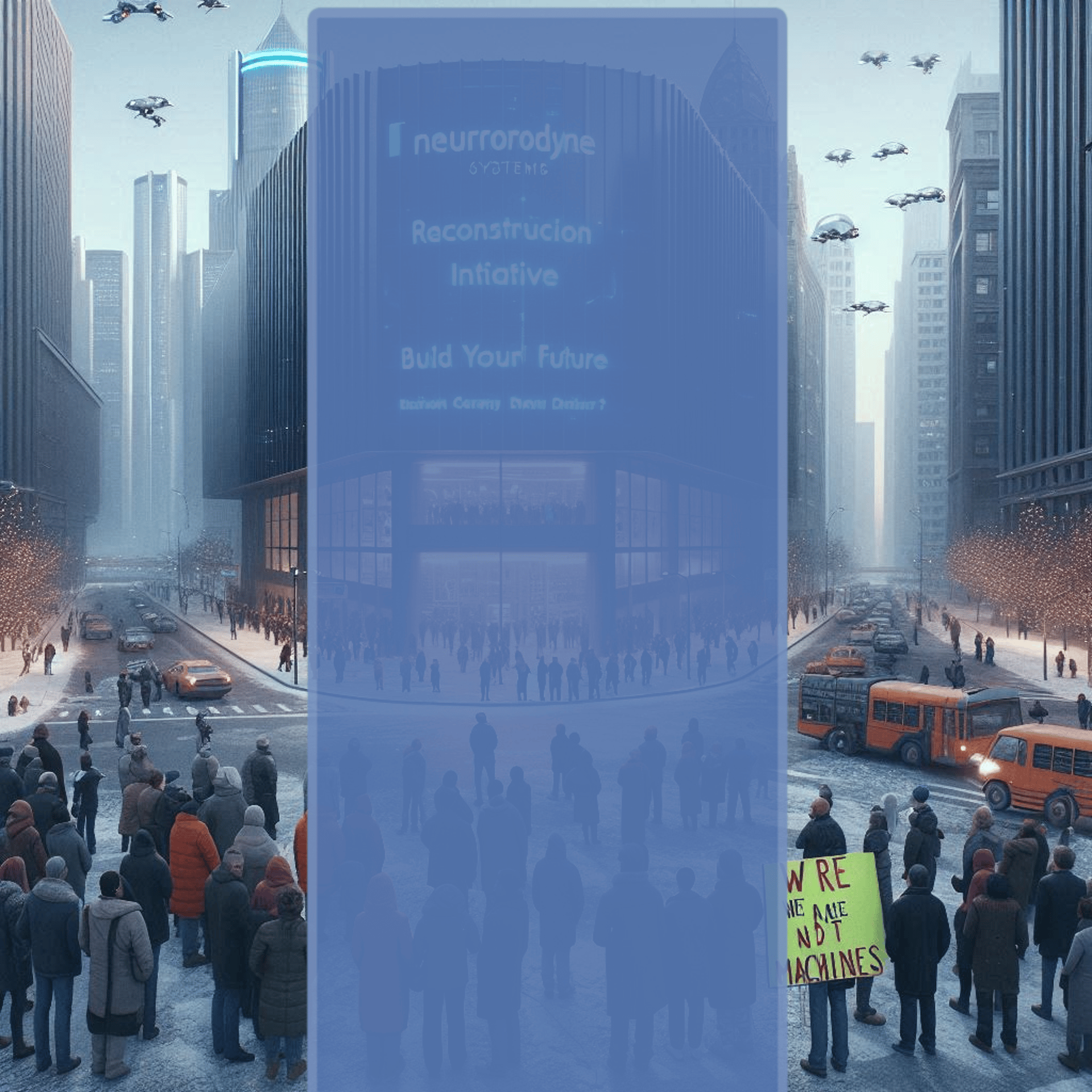Detroit’s “Reconstruction Initiative” Offers Cybernetic Jobs to Coastal Refugees
In Detroit, a city struggling to absorb thousands of coastal refugees, NeuroDyne Systems launches a controversial program offering free cybernetic implants in exchange for multi-year labor contracts. Supporters hail it as a model for rebuilding the workforce; critics call it exploitation, sacrilege, or a dangerous experiment on desperate civilians.
IWNCYBERNETICSDETROITCOASTAL SEAWALL FAILURE AFTERMATH
Rafael Ormond | InterWorld News Network (IWN)
12/4/20643 min read

Detroit — December 4, 2064 (IWN) — Amid the economic strain of tens of thousands of coastal refugees arriving in Michigan, one of the nation’s leading biotech firms has stepped forward with what it calls a “mutually beneficial solution.”
NeuroDyne Systems, the same company that helped unveil the world’s first commercially viable neural augmentation systems earlier this year, announced a new partnership with the Detroit Reconstruction Authority to retool refugees displaced by rising sea levels and coastal evacuations.
The program, called the Detroit Reconstruction Initiative, offers participants a package of cognitive and sensory implants — including enhanced recall, accelerated processing, and improved visual and auditory acuity — in exchange for a five-year employment contract with NeuroDyne or one of its affiliated partners.
“We see this as a new form of civic rebuilding,” said Dr. Alina Cortez, NeuroDyne’s chief scientist, during a press event held at the company’s renovated Midtown campus. “These individuals have lost their homes and livelihoods. We’re offering them a chance to rebuild both — with skills that will place them at the forefront of tomorrow’s economy.”
According to the Detroit city council, the initial rollout will involve 5,000 participants in 2065, with priority given to refugees registered through the federal relocation program. City officials estimate the effort could inject nearly $200 million in new labor output into the region within three years.
Business Leaders Applaud the Move
Local employers have responded enthusiastically.
“This is how Detroit leads again,” said Marcus Halden, president of the Detroit Manufacturing Guild. “In a few years, we’ll have a wave of workers trained, enhanced, and ready to compete in the new technical economy. It’s the kind of long-term thinking this city has needed since the automation collapse.”
Analysts note that by the time the five-year contracts expire, the newly augmented refugees will become a valuable addition to the broader workforce, potentially revitalizing industries ranging from logistics to robotics maintenance.
Unequal Access Sparks Local Anger
Not everyone is celebrating. Some residents voiced frustration that refugees are receiving enhancements for free, while locals still face six-figure costs for elective augmentations.
“I’ve worked in auto diagnostics for fifteen years,” said Derrick Vaughn, a Detroit native. “I can’t afford implants. But somebody off a transport bus can get them and a job? How’s that fair?”
Critics warn the program could deepen existing divides between those with corporate sponsorship and those forced to pay out of pocket.
Religious Leaders Condemn the Program
Several religious organizations have condemned the initiative as morally reckless.
“This is an affront to creation,” said Pastor Ruth Adisa of the Detroit Assembly of Hope. “To alter the mind and body in this way is to play god. These refugees need compassion, not corruption of their humanity.”
Churches across the region have organized nightly vigils outside NeuroDyne’s downtown facility, calling on the city to suspend the program until further ethical review.
Industry Competitors Urge Caution
Rival companies have also voiced unease at the scale and speed of the rollout. Optivance Biotech, known for its advanced retinal implants, issued a statement warning that widespread deployment of untested cortical augmentation “poses unacceptable long-term neurological risks.”
A spokesperson for Synapse Forge echoed the concern, citing a lack of published peer-reviewed data. “The technology is promising,” the statement read, “but it is not yet stable for mass civilian use. Detroit may soon discover that first movers also carry the heaviest burden.”
Conspiracy Claims Gain Traction
On social feeds, unverified claims have begun circulating that NeuroDyne’s refugee program is secretly a government subcontract for military and police field trials.
“You don’t hand out thousands of neural implants without wanting the data,” said a local activist who identified himself only as “Gibson.” “They’re testing civilian control networks under the guise of humanitarian aid.”
NeuroDyne officials flatly denied the accusation. “This program has no military affiliation,” said Dr. Cortez. “Every participant is a volunteer, and all oversight is civilian.”
City’s Future in the Balance
Mayor Lina Serrano, whose administration brokered the agreement, defended the partnership.
“Detroit is rising again because we take bold steps,” Serrano said. “We cannot rebuild the economy of the 21st century with the tools of the 20th. If this program works, it will put Detroit at the forefront of global innovation.”
As the first surgeries begin in the coming weeks, the debate continues to divide the city — between those who see a renaissance and those who fear a line is being crossed.
© 2025. All rights reserved.
Stay Informed, Stay Connected
Get real-time updates on global news developments.
